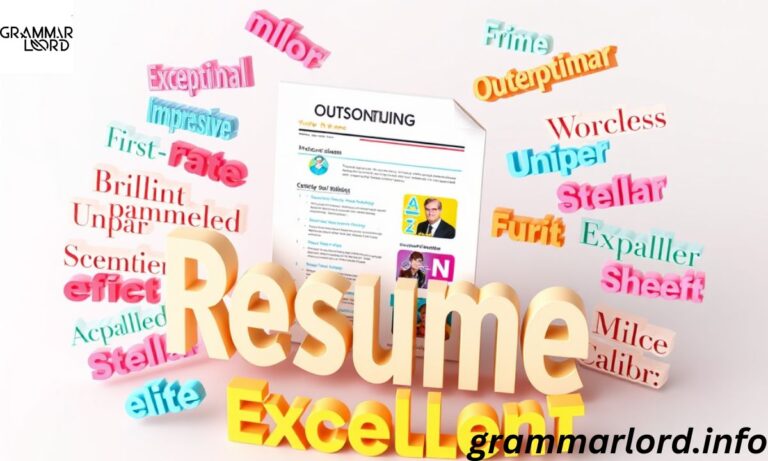In the competitive job market, your resume must stand out. One way to do this is by using strong, varied language that highlights your achievements and skills.
Instead of overusing the word “excellent,” consider incorporating some dynamic synonyms that will make your resume more engaging. Below are 21 powerful synonyms for “excellent” that you can use to enhance your resume.
Main Points
- Enhance your language: Use varied synonyms for “excellent” to make your resume stand out.
- Highlight your uniqueness: Words like “exceptional” and “remarkable” show you’re a rare talent.
- Show superior skills: Use terms like “superior,” “proficient,” and “masterful” to emphasize expertise.
- Indicate impactful achievements: Words like “outstanding” and “phenomenal” highlight significant contributions.
- Demonstrate leadership: Words like “distinguished” and “exemplary” reflect strong leadership qualities.
- Communicate top-tier quality: Use “first-rate,” “top-notch,” or “world-class” to signal high standards.
- Stand out with creativity: “Brilliant” and “stellar” demonstrate innovation and brilliance in your work.
- Convey reliability: Terms like “high-quality” and “skillful” assure employers of consistent excellence
Outstanding
When describing your achievements, using the word “outstanding” indicates that your contributions have exceeded expectations. It conveys a sense of excellence that goes beyond the ordinary, suggesting that your work or skills have been recognized as superior.
In your resume, you might say, “Delivered outstanding results in project management” or “Consistently achieved outstanding customer satisfaction ratings.” Using “outstanding” will make your abilities and accomplishments stand out to potential employers.
Exceptional
“Exceptional” implies that your performance or skill is not only above average but also unique in some way. It highlights your ability to deliver results that go beyond the expected standards, showing potential employers that you’re a rare talent.
For example, “My exceptional problem-solving skills contributed to the success of multiple high-profile projects” is a great way to illustrate your superior abilities. It helps you highlight what makes you different from other candidates.
Impressive

The word “impressive” carries the connotation of leaving a strong and positive impact on others. It suggests that your work has caught the attention of others for its high quality or effectiveness.
You could incorporate “impressive” in a sentence such as, “I presented an impressive marketing strategy that increased engagement by 50%.” Using this term demonstrates that your work is both attention-grabbing and effective.
Top-notch
“Top-notch” is a casual but effective way of saying that something is of the highest quality. It’s a great way to convey that your skills, work ethic, and results are among the best in the industry or field.
An example of using “top-notch” might be, “I consistently deliver top-notch presentations to senior leadership.” It communicates to employers that you are at the top of your game and highly reliable.
Superior
The word “superior” signals that your abilities are at a higher level than those of others in your field. It suggests that you stand out as a leader in your area of expertise and can offer a greater contribution than others.
A resume example could be, “I achieved superior sales results through effective negotiation techniques.” This positions you as someone who is not just good but exceptionally capable in your role.
Remarkable
Using “remarkable” conveys that your achievements are worth noticing, indicating that others have taken note of your exceptional abilities. It suggests that you have made a significant impact in your field.
For instance, you might write, “I led a remarkable team that launched a new product ahead of schedule.” This demonstrates that your leadership and initiative have resulted in noteworthy achievements.
Phenomenal
The term “phenomenal” suggests that your performance is extraordinary, indicating that you’ve gone above and beyond to achieve remarkable results. It’s a great way to highlight truly exceptional skills and contributions.
An example could be, “My phenomenal ability to analyze data led to a 30% increase in operational efficiency.” It suggests a level of excellence that’s not easily matched, making your skills stand out.
Exemplary
“Exemplary” is a strong way of saying that you are a role model in your field. It signifies that your work is the standard by which others are judged, suggesting both consistency and excellence in performance.
For example, “I consistently received exemplary performance reviews from my supervisors” shows that you’re a top-tier employee who sets the bar for others.
First-rate
When you describe something as “first-rate,” you’re emphasizing its top-tier quality. This term suggests that you don’t just meet expectations but far exceed them, making it perfect for highlighting your best work.
You could say, “I provided first-rate customer service, resolving over 95% of client issues on the first call.” It showcases your ability to go above and beyond in your role.
Accomplished
Describing yourself as “accomplished” conveys a sense of fulfillment and expertise in your field. It highlights your broad range of skills and experience, showing that you’ve achieved noteworthy successes throughout your career.
For instance, “As an accomplished project manager, I led cross-functional teams to deliver complex projects on time and within budget” communicates a high level of professionalism.
Distinguished
“Distinguished” is a strong way to say that you stand out due to your achievements, experience, or skills. It implies that you have a noteworthy reputation and are considered a leader in your field.
An example of using “distinguished” would be, “I earned a distinguished award for my contributions to innovation in software development.” This demonstrates that your achievements have been recognized and celebrated.
Masterful
The word “masterful” implies a high level of skill, proficiency, and expertise in a particular area. It suggests that you’ve mastered your craft and can perform tasks with great precision and competence.
For example, “I delivered a masterful presentation that won over the client” shows that you have superior skills in a specific area, such as communication or sales.
World-class
When you describe something as “world-class,” you are emphasizing that it is of the highest quality, on par with the best globally. This term indicates that you bring top-tier talent and experience to the table.
For instance, “I developed a world-class customer service program that received rave reviews” positions you as a standout in your field, with a global standard of excellence.
Stellar
“Stellar” conveys a sense of brilliance and excellence, suggesting that your performance or abilities are exceptional and noteworthy. It’s a great way to describe accomplishments that shine above the rest.
An example sentence could be, “My stellar communication skills helped resolve conflicts quickly and efficiently.” This highlights that your abilities are top-notch in critical areas.
Brilliant
“Brilliant” implies that your work is not only excellent but also showcases a high level of intelligence and creativity. It’s an ideal word for demonstrating innovation and outstanding problem-solving abilities.
For instance, “I developed a brilliant solution that saved the company $1 million annually” demonstrates how your ingenuity leads to incredible results.
Proficient
Being “proficient” indicates that you have advanced skills in a particular area. It suggests that you can complete tasks effectively and efficiently, meeting or exceeding expectations consistently.
For example, “I’m proficient in multiple programming languages, including Python and Java” shows that you have solid expertise and a broad skill set.
Skillful
“Skillful” highlights that you have an innate ability or learned expertise in completing tasks. It conveys that you possess the competence needed to deliver high-quality results consistently.
A sentence such as, “I’m a skillful negotiator, securing favorable terms for both clients and the company” shows your ability to excel in specific tasks.
High-quality
Describing something as “high-quality” implies that it meets the highest standards and expectations. It suggests that the results you produce are reliable and of exceptional value.
For example, “I produced high-quality content that improved the company’s online presence by 40%” indicates that you consistently provide results of the best caliber.
Unparalleled
The term “unparalleled” suggests that your skills, experience, or achievements are unmatched. It indicates that you stand out above all others in your field, setting a standard that’s impossible to beat.
For instance, “I have unparalleled expertise in data analysis, helping my team achieve significant breakthroughs” emphasizes that your abilities are rare and exceptional.
A-1
“A-1” is a colloquial term used to describe something of the best possible quality. It’s a great, informal way to express that you are the best at what you do.
An example might be, “I deliver A-1 customer service, ensuring satisfaction with every client interaction” a simple but effective way to convey excellence.
Supreme

“Supreme” conveys the highest level of excellence, signaling that your achievements and contributions are top-tier. It’s an excellent way to describe accomplishments that are second to none.
For example, “I consistently provided supreme leadership during complex projects” positions you as someone who excels in critical areas.
Frequently Asked Questions
What is the best synonym for “excellent” to use in my resume?
It depends on the context, but “outstanding,” “exceptional,” and “superior” are excellent options for most situations, as they strongly highlight your achievements.
How can I use these synonyms in my resume effectively?
Use these synonyms in the context of your achievements or skills, ensuring they highlight your specific accomplishments, such as “exceptional problem-solving” or “outstanding leadership.”
Are these synonyms better than using the word “excellent” on my resume?
Yes, using more specific and dynamic synonyms can make your resume stand out more and show a higher level of professionalism and versatility.
Can these synonyms help in job interviews as well?
Absolutely! Using these terms in interviews can help you articulate your skills and achievements more effectively, showcasing your value to potential employers.
Should I use these synonyms only in the job description section?
These synonyms can be used throughout your resume, including in your skills section, professional summary, and job descriptions, to reinforce your strengths.
Conclusion
Incorporating a variety of synonyms for “excellent” into your resume can significantly improve its impact. By using terms like “outstanding,” “exceptional,” and “superior,” you not only avoid repetition but also convey a higher level of professionalism and achievement.
Choose the word that best fits the context of your accomplishments, and watch as your resume gets noticed by hiring managers.

